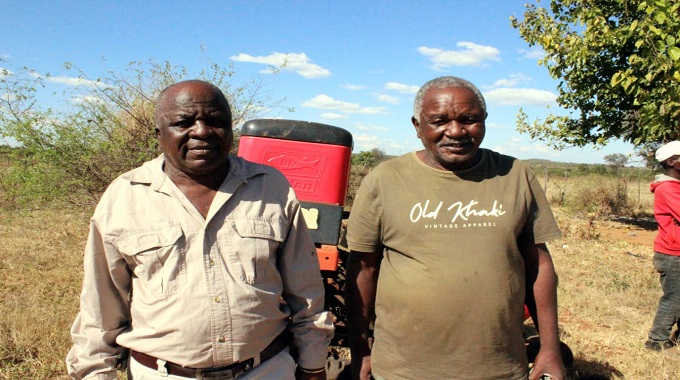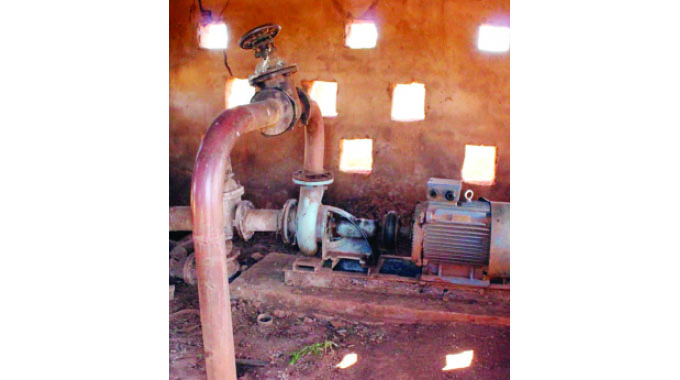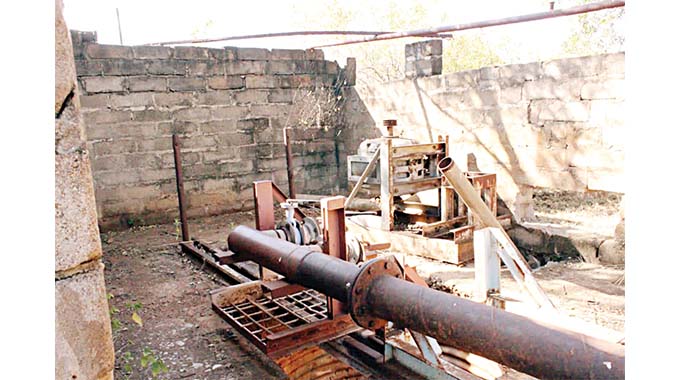
The Sunday News

Judith Phiri, Features Reporter
The once thriving 25-hectare Diglis Park Irrigation Scheme, in Bubi District, Matabeleland North Province, is now a derelict piece of land with no agricultural activity taking place.
The sad development has led to plot holders appealing for assistance from the Government and other stakeholders in a bid to revive the scheme which is being choked by a combination of factors such as lack of resources and proliferation of mining activities right on the scheme itself. The scheme is home to nine farmers who were allocated land under Government’s land reform programme in 2001 and had been cropping cereals and horticultural produce.
However, for the past two years, activities at the irrigation scheme have been on halt following vandalism and dilapidation of infrastructure such as the fencing which has been a barrier to confine or exclude people or animals into the premises.
Speaking during a tour of the facility, Diglis Park Irrigation Scheme vice secretary, Mr Miller Mlilo who is also the Zanu-PF Bubi District Ward 23 chairman and aspiring Councillor, said they needed assistance to fence the irrigation scheme.
“We have received various assistance from the Government in terms of mechanisation such as a tractor, planter, disk and horse as well as inputs and fertilisers among others. These have allowed us to work well in the past. The challenge which is there now is the fence that has been dilapidated and vandalised.
“We have been trying to fix it here and there as much as we could and at the end, we have had to say each member should fence their two hectares because of cattle that would come inside, eat and destroy our crops.”
He said resource pulling to get a fence that covers the whole irrigation scheme has been a challenge for them.
Mr Mlilo said the scheme has been at a standstill for the past two years while cattle have continued to destroy the fences and damage their rain-fed crops.
“This has taken us back a lot and that is why we have resorted to appealing for assistance so that we can fence the whole area. Most of the equipment is there, while there is also a good source of water and availability of electricity to irrigate.”
Among other challenges at the facility, Mr Mlilo said a mine was being operated inside the irrigation scheme thereby affecting their cropping.

Mr Miller Mlilo and Mr Justin Moyo at Diglis Park Irrigation Scheme. Picture by Rejoyce Sibanda
He said as an aspiring Councillor, he was not against mining which was also key for the development of the area together with agriculture, however, there was need for the operations to be done outside the irrigation scheme.
“I believe this place (irrigation scheme) could sustain Inyathi in terms of food security while we can sell the surplus produce to Bulawayo up to Nkayi and surrounding areas.
“The development of the area is key and both agriculture and mining can coexist if done properly. The mining operations should be done outside the irrigation scheme to allow for all year round cropping inside,” he added.
Echoing the same sentiments, the irrigation scheme vice chairman, Mr Justin Moyo said they were not fighting or chasing the miner away but the mining is affecting their cropping.
“We failed to harvest anything from the maize that we planted last year in November as most of our plants were destroyed by the cattle, while the little that was left behind, we believe could have been allegedly stolen by illegal miners and a number of people who pass through this irrigation scheme.
“This is why we need assistance in terms of fencing off this area and putting two gates so that only plot holders have access to the irrigation scheme. We witnessed a tremendous loss because you can’t plant for other people to enjoy the benefits of your sweat.”
He said failure to secure the area has left the scheme at the mercy of thieves as some of the electricity cables and components of water pumps have been stolen, while other infrastructure has been vandalised.

Some of the water pumps at Diglis Park Irrigation Scheme, Bubi District
Meanwhile, the Agricultural and Rural Development Authority (Arda) continues to revive irrigation schemes with a target of 450 across the country under the Vision 2030 Accelerator Model.
The Vision 2030 Accelerator Model was launched by President Mnangagwa in 2021 to stimulate rural industrialisation as part of the Second Republic’s drive to scale up agricultural transformation.
The programme supports farming growth and is in line with National Development Strategy 1 (NDS1), the country’s five-year economic blueprint that guides implementation of bold strategies aimed at achieving economic transformation by 2030.
In line with the Government’s devolution agenda, which is anchored on ensuring that ‘no one and no place is left behind’ in terms of development, the Matabeleland region like the rest of the country, is benefiting from the accelerated irrigation scheme revival programme.
In a recent interview, Arda chief executive officer (CEO), Mr Tinotenda Mhiko said they were uplifting 1,1 million households that are residing at the 450 irrigation schemes dotted across the country’s five agro ecological regions.
“Arda has been playing a critical role supporting the country’s national requirements through significant growth in production. Looking at wheat for example, last year we did 14 018 hectares and we harvested about 61 000 tonnes which is a 17 percent contribution to the national requirements.
“This winter wheat season we are establishing 20 000 hectares of winter wheat which is a 43 percent increase against the prior year, while we are targeting to harvest at least 100 000 tonnes, a 28 percent contribution to the country’s national requirements.”
He said Arda had been remodelled as a vehicle for national seed security and the production of climate-smart varieties, which resonates with the new policy direction of promoting agro-ecological regions and tailor-made production where they produce crops that are suited for each of the five agro-ecological regions.

Some of the water pumps at Diglis Park Irrigation Scheme, Bubi District
Mr Mhiko said in terms of transformative innovations, Arda developed and deployed a USSD platform for farmers.
“This platform has got Finance services, farmers training services, support services, payment gateway for farmers and information services for farmers through the provision of information like an early warning system.
“We use satellite images for detection of natural disasters and other things. Furthermore, in terms of our innovations, the Rural Development 8.0 programme on its own is a revolutionary innovation process,” he added.
Mr Mhiko said the interventions guarantee sustainability, continuity, profitability and viability of the irrigation schemes, while increased production and productivity dovetails their mandate of guaranteed national food, fibre, biofuels and seed security for the country.
Mr Mhiko said as a way of accelerating the attainment of Vision 2030, they have done a lot of backward integration under their commercial services division.
This is in a bid to promote global competitiveness for smallholder farmers, commercial farmers and joint venture farmers with an ultimate effect of lower shelf price of Arda value-added products and with a much quicker penetration into the export markets.
“Various herbs grown at different Arda irrigation schemes and estates are being exported, supported by the out-growers scheme of 1 000 farmers who are exporting rosella tea to Germany and other countries. That kind of transformative intervention has promoted global competitiveness for the rural households that we are working with,” said Mr Mhiko.
Arda was also registering village horticulture gardens and irrigation schemes into private companies to promote financial inclusion for rural communities.
President Mnangagwa launched the Presidential Rural Horticulture Scheme in Makorokoro, Mangwe in 2021 as part of initiatives to uplift rural communities as the country forges towards the attainment of Vision 2030.
Through village horticulture gardens, Government believes communities can be transformed from subsistence farming to commercial-oriented agriculture.



